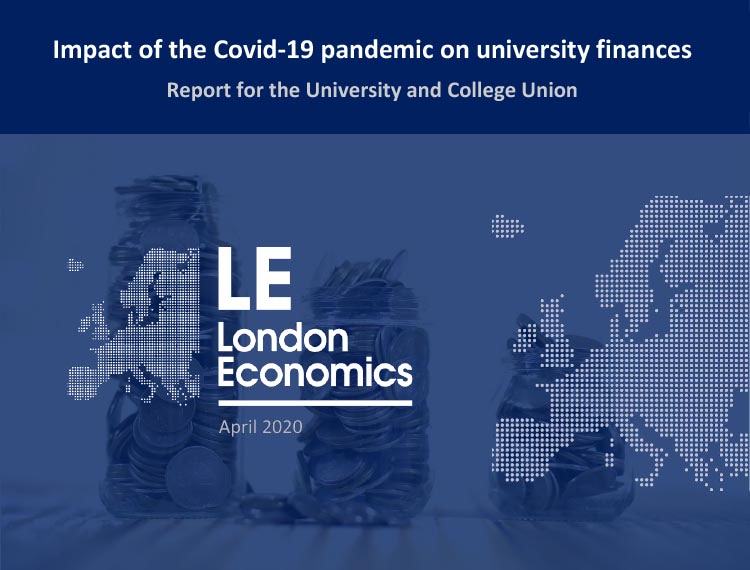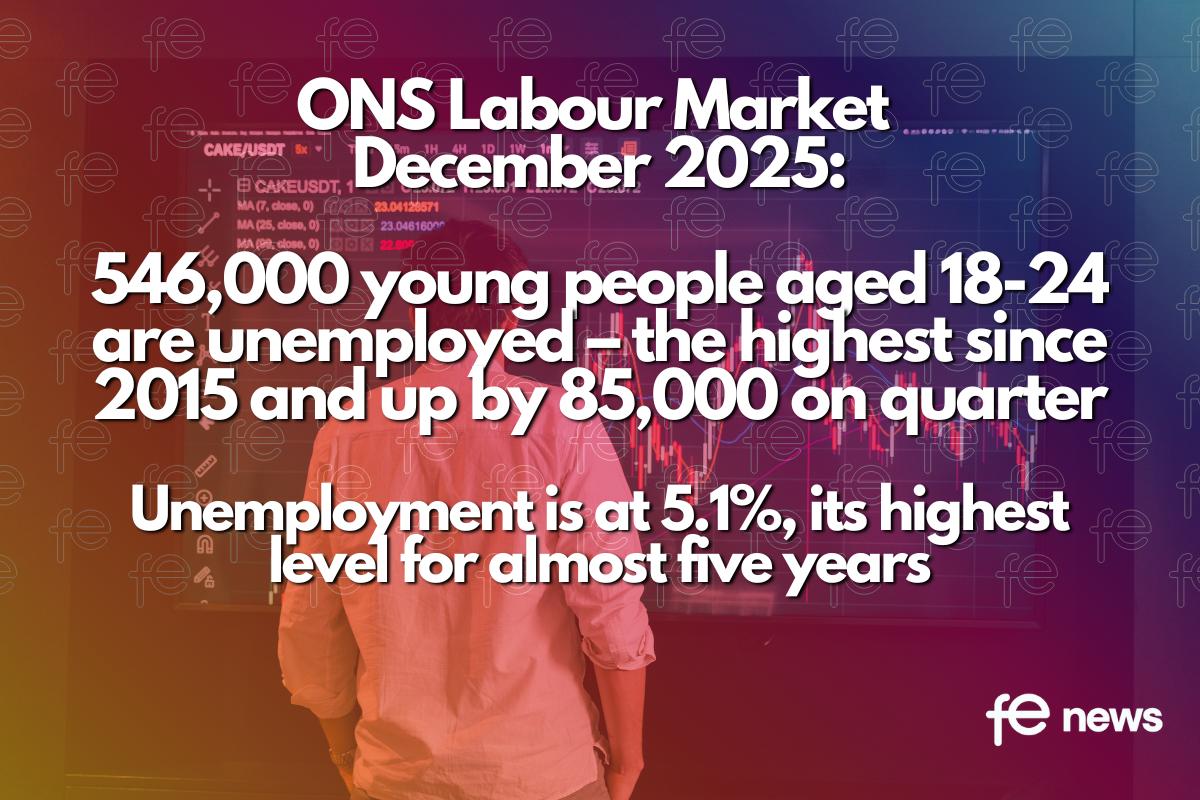Universities’ £2.5bn “black hole” will cost economy £6bn and 60,000 jobs – Sector Response

@UCU calls for government to protect university funding in order to safeguard UK’s recovery from the #coronavirus pandemic
The Covid-19 pandemic and ensuing recession will lead to 111,000 fewer UK and 121,000 fewer international first-year students attending UK universities this year, resulting in a £2.5bn funding black hole, warns a report released today (23 Apr).
 Chief Executive of Universities UK, Alistair Jarvis, said:
Chief Executive of Universities UK, Alistair Jarvis, said:
“Universities have a vital role to play in the recovery of economies and communities. This helpful report highlights the critical financial risks for the sector which not only threaten this role but put some universities at risk of financial failure.
“The union is absolutely right to warn of the knock-on impacts this would have for jobs, regional economics, local communities and students.
“Government must take urgent action to provide the support which can ensure universities are able to weather these very serious challenges, and to protect students, maintain research, and retain our capacity to drive the recovery of the economy and communities.”
 Rebecca Long-Bailey MP, Shadow Education Secretary, said:
Rebecca Long-Bailey MP, Shadow Education Secretary, said:
“The Government must step in to support universities and mitigate their funding shortfall to prevent the significant economic impact this report predicts.
“UK universities must be valued as part of the frontline response to the coronavirus pandemic, supplying students to the NHS and conducting world-class research into the virus.
“Labour is calling on the Government to underwrite all Higher Education institutions to secure their future and their role in our economic recovery and acknowledge their contribution to the national effort to fight this pandemic.’’
 UCU general secretary Jo Grady said:
UCU general secretary Jo Grady said:
‘This alarming report shows that university staff and students are now staring over the edge of a cliff and desperately need the government to step in and protect the sector. The government’s own analysis puts universities most at risk of financial pain from the current crisis and this report does not take account of other income losses, such as accommodation or conferencing
‘Our world-renowned universities are doing crucial work now as we hunt for a vaccine and will be vital engines for our recovery both nationally and in towns and cities across the UK. It is vital that the government underwrites funding lost from the fall in student numbers. These are unprecedented times and without urgent guarantees, our universities will be greatly damaged at just the time they are needed most.
‘Even with the current unfolding crisis, universities are still itching to compete to recruit students. This analysis shows how Universities UK’s student recruitment proposal simply shifts the financial pain around the sector. What students and staff really need at the moment is the government to stand behind their universities and for institutions to work cooperatively in the wider interest.
‘The vast majority of universities do not have the cash reserves to cover these losses and we would expect no university to exploit the crisis. They need to work with us to protect jobs and the sector.’
Dr Gavan Conlon, partner at London Economics, said:
“Many institutions have a very considerable exposure to international students, and the pandemic will result in a very substantial loss in enrolments and income. Government support of universities is crucial to protect students in the short term and institutional research and teaching capacity in the longer term.
“The proposed student numbers cap will not be enough to avoid an overly competitive market for the remaining pool of applicants, with the impact of this actually being worse for some institutions than the effect of the pandemic itself. Given the expected financial losses across the sector, the government’s response clearly needs to be sufficiently well funded and well planned.”
Carly Schiff, insolvency lawyer at Fieldfisher with a particular interest in the education sector, said:
“Many universities were already in trouble financially before the coronavirus crisis and are expecting to suffer from Brexit, as they stand to lose EU lecturers, EU grants and EU students. This is going to have a big impact on research funding and capabilities.
“They are also facing a well-publicised pensions black hole.
“You can have the best managed budget in the world, but you will still run into trouble if you are underfunded. And for universities, at the moment, there is no way they can make more money.
“Some are looking for private investment, such as sponsorship, wealthy donors and sports funding, but this is not going to work for many.”
 Nick Hillman, Director of HEPI, said:
Nick Hillman, Director of HEPI, said:
“It is great to see UCU and London Economics collaborating on such a detailed and important piece of work, which is based in part on some pre-crisis work undertaken for HEPI and Kaplan. I welcome the focus on the next financial year [2020/21], which is when the real pain will hit higher education, as well as the focus on what the crisis means for staff in higher education institutions and for the different regions of the UK.
“But the research needs to be part of the debate; it must not be regarded as the final word. We are in a very uncertain place right now. No one can accurately and securely predict what will happen with the progress of Covid-19; nor can we know for certain its full impact on educational institutions.
“There are grounds for querying some of the assumptions underlying the research. For example, the report assumes higher education will be considerably less attractive in 2020/21. Many dire predictions have been made on this already and no one seriously believes international student numbers will hold up. But, in a deep recession, some people may actually opt to stay in formal education. In short, the current crisis may nudge people who leave school (or graduate) while undecided about their next move to stay in education. In an economic crisis, deferring entry to the labour market makes more sense than opting for less education.
“So I wouldn’t currently bet my house on the report’s conclusion idea that there will be 111,000 fewer first-year home students, a drop of 16%, in the next academic year. Such forecasts seem to be based on the sort of polling evidence on future behaviour that wrongly predicted big falls in full-time study in England when fees increased to £9,000, and they are not guaranteed to happen.
“Moreover, the fine details that make up the headline totals matter a huge amount in research like this. This report assumes every single university will lose large numbers of students. So, for instance, it predicts 2,700 fewer first-year enrolments at each of Oxford and Cambridge – including around 900 fewer new home students at each place.
“That seems odd when there is usually huge surplus demand to attend our oldest universities. Moreover, many people are so scared of other prestigious universities sucking up a greater market share of home / EU students in the crisis that they have been demanding restrictions on student recruitment – and it is widely believed Ministers are sympathetic to this idea.
“No one should underestimate the severe impact of Covid-19 on higher education. But, given the diversity of our higher education sector, it is right to question how likely there is to be a severe recruitment crisis among all major student groups at every single institution.
“Universities need government support and the new report is a welcome addition to the evidence base explaining why this is so, but I still question the idea that it is based on ‘relatively optimistic outcomes for higher education providers’.
“Above all, we must be careful we do not foster the very conditions we want to avoid by letting pessimism take over. We must not only imply to our fellow citizens or to the rest of the world that UK universities are halfway to hell in a handcart when, in reality, every single conceivable model of a successful post-Covid and post-Brexit UK economy has our outward-facing universities at its heart.
“And that, of course, is why – despite our differences on the best ways to model the effect of the current crisis on the higher education sector – I agree with London Economics and the UCU that our universities need proper support in the months ahead.”
The report, by London Economics for the University and College Union (UCU), shows that the universities hit hardest by the falls in fee and grant income are those that cater for significant numbers of international students. However, the difficulties those universities face will also have severe knock-on effects for the rest of the sector. – See table 1
Driven by the significantly higher tuition fees charged to non-EU students, the largest decline in income is the expected loss of £1.51bn from those students. Approximately £612m of the loss comes from a drop in UK students, with a further £350m from the fall in EU students. – See table 2
The report warns that, without government intervention, an estimated 30,000 university jobs are at risk, with a further 32,000 jobs under threat throughout the wider economy. The total economic cost to the country from the reduced direct and indirect economic activity generated by universities due to the loss in income is estimated at more than £6bn. – See tables 3 and 4
The report comes just a week after analysis by the Office for Budget Responsibility said education would be the sector hardest hit by the coronavirus crisis, with the impact likely to be felt most by universities. The report does not take account of other income losses, such as accommodation or conferencing, and is predicated on what the authors believe is a relatively optimistic approach to the recovery.
UCU said the government had to act now to protect the income of universities or it risked inflicting huge damage on a sector which will be crucial to the national recovery, and is a key player in local economies across the UK.
According to London Economics’ analysis, all universities would suffer substantial falls in income, with 91 institutions (almost three-quarters) left in a critical financial position where income only just covers expenditure. – See table 5
The report also warns that a recent proposal from Universities UK – to allow institutions to recruit more students – up to a cap of 5% on top of their existing numbers – would merely shift the financial impact onto less wealthy institutions. – See table 6
At the start of the month, the union wrote to education secretary Gavin Williamson with seven proposals it said would ensure universities and colleges can retain academic capacity now and play their part in the recovery.
Table 1 – Estimated impact of the pandemic on first-year student enrolments in 2020-21, by student domicile and institution cluster
|
|
Cluster 1 |
Cluster 2 |
Cluster 3 |
Cluster 4 |
Total |
% diff (to baseline) |
|
# of HEIs |
2 |
38 |
67 |
18 |
125 |
– |
|
|
||||||
|
Total across all HEIs |
||||||
|
UK |
-1,775 |
-32,725 |
-63,820 |
-12,820 |
-111,140 |
-16% |
|
EU |
-1,025 |
-13,310 |
-11,815 |
-2,260 |
-28,410 |
-47% |
|
Non-EU |
-2,595 |
-56,560 |
-31,115 |
-2,075 |
-92,345 |
-47% |
|
Total |
-5,395 |
-102,595 |
-106,750 |
-17,155 |
-231,895 |
-24% |
|
Average per HEI |
||||||
|
UK |
-885 |
-860 |
-955 |
-710 |
-890 |
-16% |
|
EU |
-510 |
-350 |
-175 |
-130 |
-225 |
-47% |
|
Non-EU |
-1,295 |
-1,490 |
-465 |
-115 |
-740 |
-47% |
|
Total |
-2,690 |
-2,700 |
-1,595 |
-955 |
-1,845 |
-24% |
Note: All numbers are rounded to the nearest 5.
Source: London Economics’ analysis
Table 2 – Estimated impact of the pandemic on universities’ income in 2020-21, by institution cluster
|
Cluster 1 |
Cluster 2 |
Cluster 3 |
Cluster 4 |
Total |
% diff (to baseline) |
|
|
# of HEIs |
2 |
38 |
67 |
18 |
125 |
– |
|
|
||||||
|
Total across all HEIs |
||||||
|
Tuition fees |
(£82m) |
(£1,336m) |
(£809m) |
(£108m) |
(£2,334m) |
-13% |
|
Teaching grants |
(£2m) |
(£65m) |
(£64m) |
(£6m) |
(£137m) |
-7% |
|
Other income |
– |
– |
– |
– |
– |
– |
|
Total |
(£85m) |
(£1,400m) |
(£872m) |
(£114m) |
(£2,472m) |
-7% |
|
Average per HEI |
||||||
|
Tuition fees |
(£41m) |
(£35m) |
(£12m) |
(£6m) |
(£19m) |
-13% |
|
Teaching grants |
(£1m) |
(£2m) |
(£1m) |
(£0m) |
(£1m) |
-7% |
|
Other income |
– |
– |
– |
– |
– |
– |
|
Total |
(£42m) |
(£37m) |
(£13m) |
(£6m) |
(£20m) |
-7% |
Note: All numbers are rounded to the nearest £m.
Source: London Economics’ analysis
Table 3 – Number of staff employed by HEIs in 2020-21 (in headcount), baseline vs. after pandemic, by cluster
|
Cluster 1 |
Cluster 2 |
Cluster 3 |
Cluster 4 |
Total |
|
|
# of HEIs |
2 |
38 |
67 |
18 |
125 |
|
|
|||||
|
Total across all HEIs |
|||||
|
Baseline |
29,365 |
256,655 |
165,945 |
23,015 |
474,980 |
|
After pandemic |
28,860 |
240,705 |
153,790 |
21,345 |
444,700 |
|
Difference |
-505 |
-15,950 |
-12,155 |
-1,670 |
-30,280 |
|
Average per HEI |
|||||
|
Baseline |
14,685 |
6,755 |
2,475 |
1,280 |
3,800 |
|
After pandemic |
14,430 |
6,335 |
2,295 |
1,185 |
3,560 |
|
Difference |
-255 |
-420 |
-180 |
-95 |
-240 |
Note: All numbers are rounded to the nearest 5.
Source: London Economics’ analysis
Table 4 – Total direct, indirect and induced economic impact generated by higher education institutions’ expenditures in 2020-21, baseline vs. after pandemic, by cluster
|
Cluster 1 |
Cluster 2 |
Cluster 3 |
Cluster 4 |
Total |
|
|
# of HEIs |
2 |
38 |
67 |
18 |
125 |
|
|
|||||
|
Economic output (£m) |
|||||
|
Baseline |
£12,175m |
£55,993m |
£29,842m |
£3,939m |
£101,949m |
|
After pandemic |
£11,964m |
£52,506m |
£27,669m |
£3,655m |
£95,795m |
|
Difference |
(£211m) |
(£3,487m) |
(£2,172m) |
(£284m) |
(£6,154m) |
|
Employment (headcount) |
|||||
|
Baseline |
60,785 |
531,260 |
343,485 |
47,635 |
983,165 |
|
After pandemic |
59,740 |
498,275 |
318,350 |
44,180 |
920,545 |
|
Difference |
-1,045 |
-32,985 |
-25,135 |
-3,455 |
-62,620 |
Note: Staff numbers are rounded to the nearest 5, and monetary estimates are rounded to the nearest £m.
Source: London Economics’ analysis
Table 5 – Estimated net cash inflow from operating activities (in £m and as a % of income) in 2020-21, baseline vs. after pandemic, by institution cluster
|
Cluster 1 |
Cluster 2 |
Cluster 3 |
Cluster 4 |
Total |
|
|
# of HEIs |
2 |
38 |
67 |
18 |
125 |
|
|
|||||
|
Net cash inflow (% of total income) |
|
||||
|
Baseline |
3.5% |
9.1% |
10.4% |
9.7% |
9.8% |
|
After pandemic |
1.7% |
2.2% |
3.4% |
2.5% |
2.9% |
|
|
|||||
|
Net cash inflow (per institution) |
|
||||
|
Baseline |
£79m |
£47m |
£18m |
£8m |
£26m |
|
After pandemic |
£36m |
£10m |
£5m |
£2m |
£6m |
|
# of HEIs with net cash inflow <5% |
|||||
|
Baseline |
1 |
5 |
10 |
5 |
21 |
|
After pandemic |
2 |
31 |
47 |
11 |
91 |
|
|
|||||
|
# of HEIs with net cash inflow <0% |
|
||||
|
Baseline |
0 |
1 |
4 |
2 |
7 |
|
After pandemic |
1 |
12 |
16 |
7 |
36 |
Note: All monetary estimates are rounded to the nearest £m.
Source: London Economics’ analysis
Table 6 – Estimated impact of the pandemic on first-year student enrolments in 2020-21, ‘capped’ vs. ‘uncapped’ students, by institution cluster
|
Cluster 1 |
Cluster 2 |
Cluster 3 |
Cluster 4 |
Total |
|
|
# of HEIs |
2 |
38 |
67 |
18 |
125 |
|
|
|||||
|
Decline in first-year students |
|||||
|
‘Capped’ students (UK and EU UG FT only) |
-880 |
-23,590 |
-42,480 |
-8,775 |
-75,725 |
|
‘Uncapped’ students |
-4,515 |
-79,005 |
-64,270 |
-8,380 |
-156,170 |
|
Total |
-5,395 |
-102,595 |
-106,750 |
-17,155 |
-231,895 |
|
|
|
|
|
|
|
|
Cap on UK and EU-domiciled UG FT students |
|
|
|
|
|
|
100% of 2018-19 enrolments |
5,780 |
148,150 |
259,860 |
49,500 |
463,290 |
|
105% of 2018-19 enrolments |
6,070 |
155,560 |
272,855 |
51,975 |
486,455 |
|
Difference with additional 5% |
290 |
7,410 |
12,995 |
2,475 |
23,165 |
|
Ratio of decline in total to ‘capped’ students |
|||||
|
Ratio |
6.1 |
4.3 |
2.5 |
2.0 |
3.1 |
Note: All student numbers are rounded to the nearest 5.
Source: London Economics’ analysis
Director of HEPI, Nick Hillman, said:
It is great to see UCU and London Economics collaborating on such a detailed and important piece of work, which is based in part on some pre-crisis work undertaken for HEPI and Kaplan. I welcome the focus on the next financial year [2020/21], which is when the real pain will hit higher education, as well as the focus on what the crisis means for staff in higher education institutions and for the different regions of the UK.
But the research needs to be part of the debate; it must not be regarded as the final word. We are in a very uncertain place right now. No one can accurately and securely predict what will happen with the progress of Covid-19; nor can we know for certain its full impact on educational institutions.
There are grounds for querying some of the assumptions underlying the research. For example, the report assumes higher education will be considerably less attractive in 2020/21. Many dire predictions have been made on this already and no one seriously believes international student numbers will hold up. But, in a deep recession, some people may actually opt to stay in formal education. In short, the current crisis may nudge people who leave school (or graduate) while undecided about their next move to stay in education. In an economic crisis, deferring entry to the labour market makes more sense than opting for less education.
So I wouldn’t currently bet my house on the report’s conclusion idea that there will be 111,000 fewer first-year home students, a drop of 16%, in the next academic year. Such forecasts seem to be based on the sort of polling evidence on future behaviour that wrongly predicted big falls in full-time study in England when fees increased to £9,000, and they are not guaranteed to happen.
Moreover, the fine details that make up the headline totals matter a huge amount in research like this. This report assumes every single university will lose large numbers of students. So, for instance, it predicts 2,700 fewer first-year enrolments at each of Oxford and Cambridge – including around 900 fewer new home students at each place.
That seems odd when there is usually huge surplus demand to attend our oldest universities. Moreover, many people are so scared of other prestigious universities sucking up a greater market share of home / EU students in the crisis that they have been demanding restrictions on student recruitment – and it is widely believed Ministers are sympathetic to this idea.
No one should underestimate the severe impact of Covid-19 on higher education. But, given the diversity of our higher education sector, it is right to question how likely there is to be a severe recruitment crisis among all major student groups at every single institution.
Universities need government support and the new report is a welcome addition to the evidence base explaining why this is so, but I still question the idea that it is based on ‘relatively optimistic outcomes for higher education providers’.
Above all, we must be careful we do not foster the very conditions we want to avoid by letting pessimism take over. We must not only imply to our fellow citizens or to the rest of the world that UK universities are halfway to hell in a handcart when, in reality, every single conceivable model of a successful post-Covid and post-Brexit UK economy has our outward-facing universities at its heart.
And that, of course, is why – despite our differences on the best ways to model the effect of the current crisis on the higher education sector – I agree with London Economics and the UCU that our universities need proper support in the months ahead.











Responses